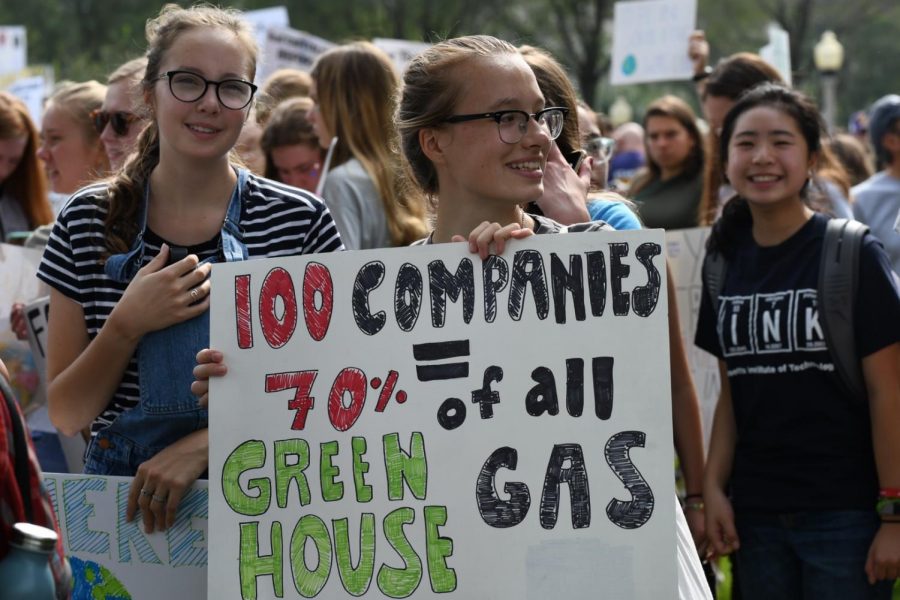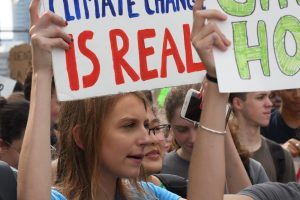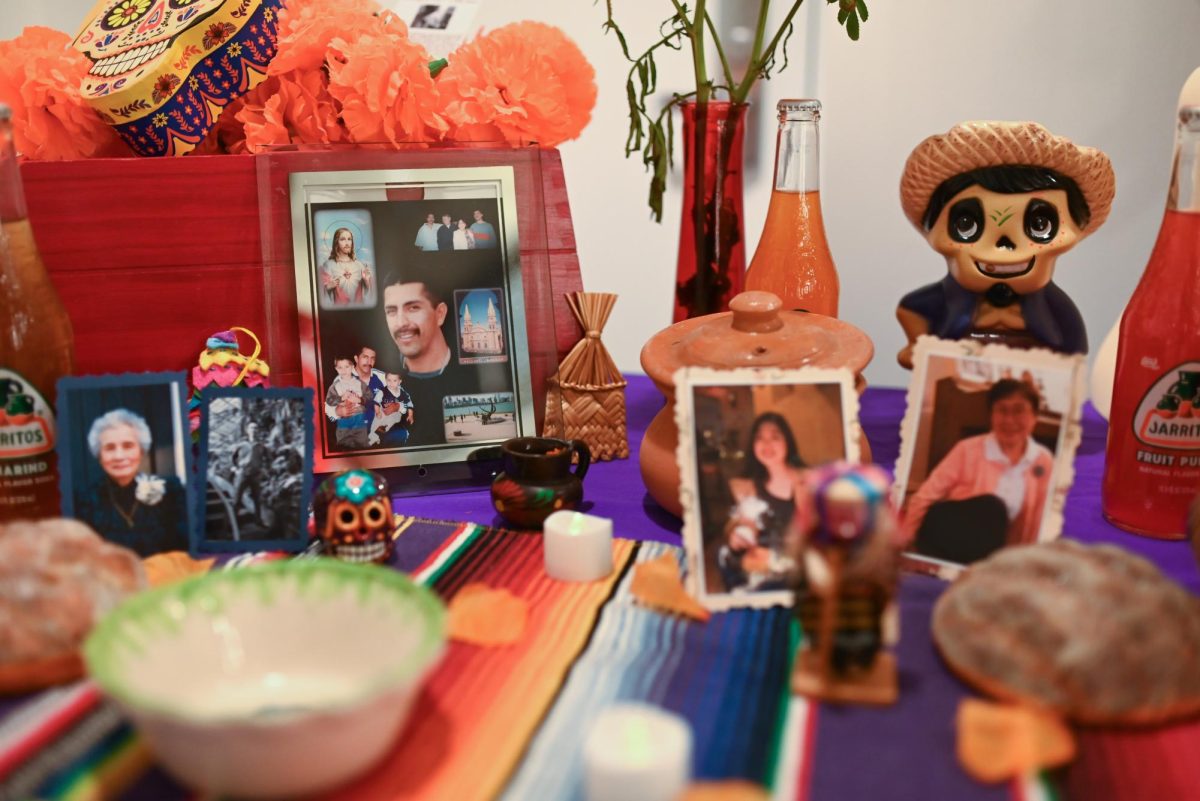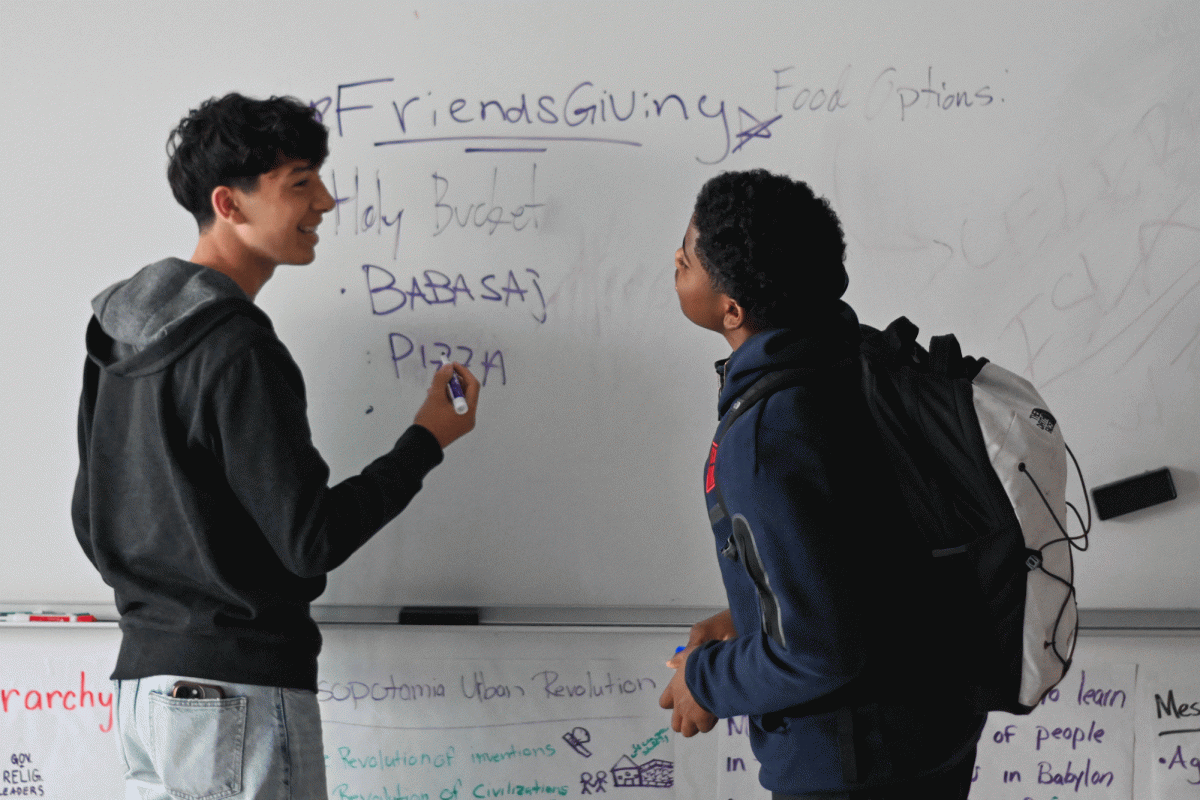Lab students participate in Global Climate strike in Chicago
September 20, 2019
In an age where social-media “slack-tivism” is ruthlessly criticized, these student protesters say they’re committed to walking the walk. Literally.
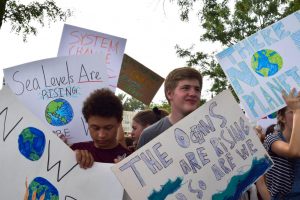
LABBIES RISE. Cole MacSwain and Miles Warshauer stand with U-Highers and other climate-strike participants Sept. 20. After leaving Grant Park, Cole and Miles marched and chanted along with thousands of others to Federal Plaza.
Joining a nation-wide “youth climate strike” Sept. 20, around 40 U-High students marched from Grant Park to Federal Plaza in downtown Chicago. United by a shared agenda of banning fossil fuels, creating clean-energy jobs and instituting the Green New Deal, the protesters saw missing school as a necessary and worthwhile sacrifice.
Juniors Orla Molloy and Rachel Scruby heard about this event over the summer and wanted to involve their fellow students. While the U-High administration did not grant excused absences, Orla said this shouldn’t have discouraged potential protesters.
“Some people are worried about how much schoolwork they’ll have to catch up on, or they have a quiz that day, or they have a lab report due that day,” Orla said. “In the long run, it’s just one day of school, and if I didn’t go, I’d wonder what I was missing out on.”
For Eliza Doss, a junior, the choice was simple.
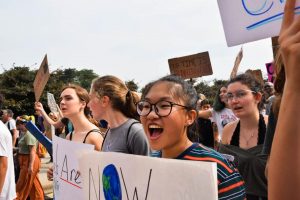
STEPPING UP, SPEAKING OUT. Eliza Doss, junior, chants while holding her “Now or Never” sign alongside Chicago youth during climate strike at Federal Park.
“At the end of the day the earth is more important than school,” she said. “If we don’t care about the future of the earth, then what’s the point of everything we do?”
At 11 a.m, participants gathered at the south end of Grant Park, where people took group photos, organizers led chants and activists handed out flyers to student protesters.
Crowded as it may have been, senior Anika Gupta was familiar with the atmosphere. In March 2017, her family took a last-minute drive to Washington, D.C., to attend the March for Our Lives. Today, she wanted to continue her activism.
“When I learned about the global factor of the strike, I was like, ‘I have to go’ because I care about this so much I just have to be there. If Amazon workers can walk out today, then I can,” Anika said, referring to a walkout by workers of the global tech company.
Like many youth climate activists, Anika was motivated by her love for the natural world — a world she’s desperate not to lose.
“These rising climates are threatening a lot of species, they’re threatening a lot of landscapes. There’s so much that we don’t know about this planet, and we’re already destroying it. I don’t want to miss anything in the process,” Anika said.

CLIMATE CONSCIOUS. Gathering in Grant Park, hundreds of people stand with others nationwide for climate strike Sept. 20. Signs up, chants blearing, activists headed to Federal Plaza.
The march from Grant Park to Federal Plaza took over an hour, but the participants’ enthusiasm never seemed to falter. Every few minutes someone would begin a new chant, such as: “Planet over profit!” or “Hey Hey! Ho Ho! Donald Trump has got to go!” Which the crowd would almost immediately pick up.
Rachel, Orla and several dozen of their classmates completed pre-arranged absence forms, and met with their teachers to account for missed work. Neither believed this undermines the message of the strike, and both encouraged their fellow protesters to do the same.
Rachel said, “For me, I don’t think the fact that I am planning ahead doesn’t make it less important. It doesn’t diminish the message. I’m still losing out on the lessons I’d be learning that day.”
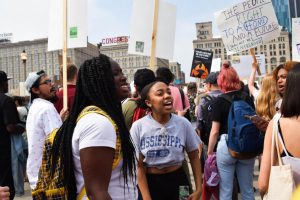
POWER IN NUMBERS. Chanting along with students from Kenwood Academy, juniors Kennedy Coats and Destiney Williamson chant turn on to Michigan Avenue, as they near the end of the Global Climate Strike.
According to both organizers, the response from faculty and administration was “positive.” However, Orla said they wanted the protest to remain as student-run as possible, and did not bring a faculty sponsor.
“This is a student thing, This is an ‘us’ thing,” she said.
In fact, Rachel says the lack of administrative involvement renders their message all the more powerful.
“They’re not promoting it, which is good,” Rachel said. “Of course, it’s not their job to promote it, it’s the students’ job, but it does kind of send the message that the kids are kind of the ones who are caring about it the most.”
For participant Lea Rebollo Baum, climate activism is all about sacrifice. In order to reverse the effects of climate change, she said her peers may need to give up some of the luxuries enjoyed by generations past.
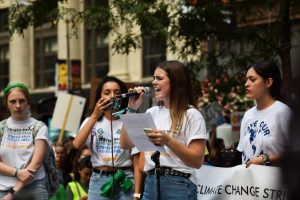
LEADING THE CHARGE. Chicago strike organizer Isabella Johnson, a senior at Benet Academy in Lisle, Illinois, delivers the main speech at the Global Climate Strike. Johnson spoke at Federal Plaza, the final destination of the march, along with several other leaders of the strike.
“Obviously, when I raise my children, things will be different. That kind of scares me because I know that making changes now will obviously alter our lives greatly, but if it’s for the better, it will be worth it. If we continue the way we have been for hundreds of years, quality of life will be horrible,” Lea said.
No matter how small, the protesters say they’re willing to make sacrifices, like having to make up a Biology test.
Rachel said, “There are some things that are more important than education right now. I want a good education, but in the bigger picture, it’s worth it.”
AUDIO RESPONSES by Ella Beiser
Junior Andrada Nicolae argues that systematic change is the only way to make an impact at the Youth Climate Strike.
Jackson Bauer, a junior, said that he hopes to bring awareness about climate change because he feels that leaders and peers are complacent. Listen:




